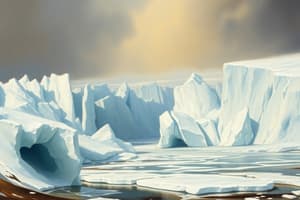Podcast
Questions and Answers
What is the primary shape of valleys formed by glacial erosion compared to those formed by water erosion?
What is the primary shape of valleys formed by glacial erosion compared to those formed by water erosion?
- V-shaped
- Flat-bottomed
- U-shaped (correct)
- Circular
Which of the following accurately describes the sediment in the basal zone of a glacier?
Which of the following accurately describes the sediment in the basal zone of a glacier?
- Well sorted and layered
- Exclusively fine-grained silt
- Composed mainly of boulders
- Not sorted and may be highly concentrated (correct)
What is the role of ice wedging in glacial landscapes?
What is the role of ice wedging in glacial landscapes?
- It prevents glacial movement.
- It contributes to the formation of U-shaped valleys. (correct)
- It causes the melting of glaciers.
- It creates layered sediment deposits.
In which geographic location is the Matterhorn, a classic example of a glacial horn, found?
In which geographic location is the Matterhorn, a classic example of a glacial horn, found?
What type of rock has been shaped by glaciers over approximately 270 million years in Tasmania?
What type of rock has been shaped by glaciers over approximately 270 million years in Tasmania?
What does the thixotropic behavior of ice indicate about its viscosity?
What does the thixotropic behavior of ice indicate about its viscosity?
Which zone of a glacier is primarily responsible for the accumulation of snow that forms ice?
Which zone of a glacier is primarily responsible for the accumulation of snow that forms ice?
What characterizes the ablation zone of a glacier?
What characterizes the ablation zone of a glacier?
What defines the equilibrium line of a glacier?
What defines the equilibrium line of a glacier?
What type of environment is described as being influenced by melting ice but not in direct contact?
What type of environment is described as being influenced by melting ice but not in direct contact?
Which of the following is NOT a zone of a glacier?
Which of the following is NOT a zone of a glacier?
What does a moraine represent in glacial geology?
What does a moraine represent in glacial geology?
Which part of a glacier is referred to as the englacial zone?
Which part of a glacier is referred to as the englacial zone?
What primarily influences the transport of sediment in glacial environments?
What primarily influences the transport of sediment in glacial environments?
Which of the following sediment characteristics is typical for glacial deposits?
Which of the following sediment characteristics is typical for glacial deposits?
What is a primary landform created by glacial activity?
What is a primary landform created by glacial activity?
Which statement about glacial systems is true?
Which statement about glacial systems is true?
Which type of rock is typically associated with glacial environments?
Which type of rock is typically associated with glacial environments?
What does the term 'thixotropic' refer to in the context of ice as a fluid?
What does the term 'thixotropic' refer to in the context of ice as a fluid?
Why is Antarctica considered a high latitude, low altitude glacier environment?
Why is Antarctica considered a high latitude, low altitude glacier environment?
What causes the melting of ice in glacial systems?
What causes the melting of ice in glacial systems?
Flashcards are hidden until you start studying
Study Notes
Glacial Environments
- Glaciers form where snow accumulation exceeds melting
- They occur mainly at high latitudes, but can also be found at low latitudes above the snowline
- They can range in size and have varying seasonal fluctuations
- Glaciers cover 10% of the Earth's surface
Glacial Sedimentary Systems
- Glaciers are characterized by strong physical weathering, transport by ice and meltwater, and deposition at the glacial terminus and outwash zones
- Glacial sediments are poorly sorted, can be angular or rounded, and show short transport distances
- Common glacial sediment types include tillites/diamictites, laminated mudstones with dropstones, and structureless moraine deposits
Ice as a Fluid
- Glacier ice exhibits Bingham plastic properties, requiring a yield strength to be overcome before deformation
- They have both high capacity and competency, capable of transporting large volumes of sediment
Stable Glaciers
- Stable glaciers maintain a balance between snow accumulation and melting
- The type of glacier influences the specific sedimentological features it creates
Anatomy of a Glacier
- The accumulation zone, where snow compacts into ice, is located at higher altitudes
- The ablation zone, where melting occurs, is located at lower altitudes
- The equilibrium line marks where accumulation and ablation are balanced, keeping the glacier stationary
- Moraines form through the accumulation of glacial debris
Features of an Ice Flow
- The subglacial zone is the base of the glacier in contact with the bed
- The supraglacial zone represents the upper surface of the glacier
- The englacial zone refers to the interior of the glacier
- The ice-contact zone encompasses the margins of the glacier
- The proglacial environment surrounds melting ice but is not directly in contact
- The periglacial environment extends beyond the proglacial regions
Glacially Shaped Mountains
- Glaciers carve out classic bowl-shaped cirques within mountains
- Horns form when multiple cirques intersect
Ancient Glacial Landscapes
- Periglacial sedimentary rock shaped by ancient glaciers can reveal past glacial activity
Glacially Shaped Valleys
- Valleys carved by water are V-shaped
- Valleys carved by glaciers are U-shaped
- Glacial erosion occurs through abrasion, distributing sediment across a broader area
Glacial Erosion - Abrasion
- The largest volume of sediment transported by glaciers resides at the basal zone
- Sediment concentrations within the basal zone can reach up to 90% in warmer areas
- Sediment in glacial environments is typically layered but not sorted
- Abundant 'rock flour' is a characteristic of glacial deposits
Studying That Suits You
Use AI to generate personalized quizzes and flashcards to suit your learning preferences.




